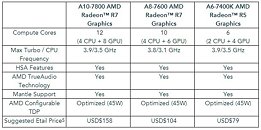Thursday, July 31st 2014

AMD Introduces New APUs for System Builder and DIY Market
AMD today introduced the new AMD A10-7800 Accelerated Processing Unit (APU) to the component channel. This 4th generation A-Series APU with 12 Compute Cores (4CPU + 8 GPU) unlocks the APU potential with Heterogeneous System Architecture (HSA) features, and boasts powerful AMD Radeon R7 Series graphics for outstanding performance across applications. Combined with AMD's acclaimed Mantle API, the AMD A10-7800 APU can enable accelerated performance across select AMD Gaming Evolved partner titles.
"The AMD A-Series APUs bring a superior level of gaming and compute experiences to the desktop PC," said Bernd Lienhard, corporate vice president and general manager, Client Business Unit, AMD. "With support for AMD's acclaimed Mantle API that simplifies game optimizations for programmers and developers to unlock unprecedented levels of gaming performance transforming the world of game development to help bring better, faster games to the PC."
Revolutionary Architecture
In addition with AMD Radeon memory, users can benefit from AMD AMP technology to help boost their gaming experience with the AMD Radeon R9 2400 Gamer Series memory which has been tested and certified for AMD A10 APUs.The AMD A-Series APUs are now available worldwide from select e-tailers, retailers and system integrators.
"The AMD A-Series APUs bring a superior level of gaming and compute experiences to the desktop PC," said Bernd Lienhard, corporate vice president and general manager, Client Business Unit, AMD. "With support for AMD's acclaimed Mantle API that simplifies game optimizations for programmers and developers to unlock unprecedented levels of gaming performance transforming the world of game development to help bring better, faster games to the PC."
Revolutionary Architecture
- Up to 12 Compute Cores (4 CPU + 8 GPU) deliver amazing performance and responsiveness, that leverages the capability of the APU on various workloads, applications and top gaming titles
- The breakthrough new Heterogeneous System Architecture (HSA) allows the CPU and GPU to work together in harmony by quickly dividing and directing tasks to the appropriate cores for new levels of performance and efficiency for desktop and notebook PCs, enabling a new era of compute capabilities with compute cores
- Award-winning Graphics Core Next Architecture with AMD Radeon R7 series graphics and compute capability makes it a top choice for gamers who expect the best
- Support for UltraHD (4K) resolutions and new video post-processing enhancements that make 1080p videos look amazing when upscaled on an UltraHD-enabled monitor or TV
In addition with AMD Radeon memory, users can benefit from AMD AMP technology to help boost their gaming experience with the AMD Radeon R9 2400 Gamer Series memory which has been tested and certified for AMD A10 APUs.The AMD A-Series APUs are now available worldwide from select e-tailers, retailers and system integrators.

11 Comments on AMD Introduces New APUs for System Builder and DIY Market
Wonder how long it will take before AMD gets this working the way it should? Probably not by 2nd gen. Maybe 3rd gen.
Look, we only use GPU "cores" if we need to do something that is:
- Repetitive;
- Doesn't return any sort of information before the full compute cycle is complete;
- Can be effectively executed on many computing devices simultaneously.
See? There's no way you can make an average business app benefit from GPU. And I'm not willing to debug GPU-specific code library written in C++ (which is the only language you can implement your compute operations with) every time I have to make a string search while I'm developing a typical Windows app with C#. Yeah, it would be 12% faster if it's done with "8 GPU cores", but it's just not worth it. Even if you done everything perfectly, which is not always the case, of course.Same goes to their legendary "not ready for FX-8000" thing. For gods' sake, we DO NOT specify in any part of our code the MAGICAL NUMBER OF CORES we're going to use, we leave this to the compiler. And it will use as many as you give; so will the runtime. If I was designing my app to be ran specifically on a supercomputer with 2880 logical CPU's, I would've implemented more of parallel stuff (like PLINQ), sure, but not when I expect the target system to have 8 of them. It's average, we don't need to handle it in a specific way.
HSA is just a myth, it's a sweet concept for those who have never tried to write an actual GPU-accelerated software. You know, like when somebody calls "AVX 2.0" a technology, we know that it's just a set of instructions, right? That's exactly the case with HSA, "GPU Cores", whatever they come up with tomorrow. It's all about marketing and not real technology.
The way that HSA practically works is simple. There's a plenty of things that you can use to manipulate data inside your application ("Sort", "Subtract", etc), and AMD just provides you with their take on them (like, "Sort: AMD Edition"). That's it. It simply uses GPU instead of CPU for executing them. No one says that it would be faster, or more flexible, or anything like that. More then that, you can only use these "accelerated" things when they are allowed, and these cases are roughly 1%, really.